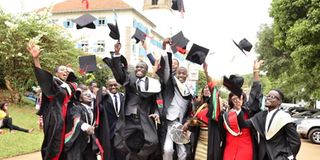Government extends student loan scheme to humanities

Makerere University graduands jubilate during the 67th graduation ceremony. File photo
What you need to know:
- Consideration. Special needs students pursuing Bachelor of Laws, Social Science and Bachelor of Arts in Education
- Exception. Other students will only be considered for a humanity course in Bachelor of Education with Special Needs.
- Shs23.4b. The amount of money expected to cater for the beneficiaries.
Kampala. The government has extended the student loan scheme to humanities but ring-fenced it to students with special needs. This, according to Mr Michael Wanyama, the executive director of Higher Education Students’ Financing Board, will give an opportunity to disabled students who have not been applying because their abilities are confined outside the science scope which the government started with.
Only students pursuing Bachelor of Laws, Social Science and Bachelor of Arts in Education will be considered.
“We have included humanities this time round but only students with disabilities will be taken care of for Law, Social Science and Bachelor of Arts in Education courses alone,” Mr Wanyama said in a recent interview.
Students without special needs will only be considered for a humanity course in Bachelor of Education with Special Needs. The first cohort of students received government loans in 2014 mainly in 26 science undergraduate courses, which later grew to 50 after the board added diploma and certificate courses.
Now in its third year, Mr Wanyama said they have added 16 more courses to the scheme.
They are looking at supporting 1,200 in the 2017/2018 academic year on top of the 3,799 students they have accumulated in the last three years from various private and government-aided institutions of higher learning.
The board started with Shs4.4b to facilitate the students’ tuition, functional fees, research and funds to cover aids and appliances for persons with disabilities. This meant that students have to meet the feeding and accommodation costs. The money has since grown to Shs18b and Mr Wanyama said they expect an additional Shs5.4b to support the new beneficiaries they will soon take on.
At the beginning, government used to pay tuition and give living allowances to students who joined institutions of higher learning but the growing numbers has made it difficult for the former to meet such growing demands.
However, there is a growing concern that while government is expanding on the number of courses to be supported, it has ignored to add on the number of beneficiaries, leaving it at an average of 1,200 students they support per year.
Mr Filbert Baguma, Uganda National Teachers’ Union (Unatu) acting general secretary, appreciated government acknowledgement of the humanities that it had hitherto discouraged students from pursuing. “ At first, government had taken it for granted that only sciences propel development. This is a sign that they are beginning to recognise humanities,” Mr Baguma said.
He also warned the board against misusing the scheme.
“There is need to define special needs. If I am a slow learner, am I not a special needs person? They need to qualify it to remove ambiguity and manipulation,” Mr Baguma shared.
And as the first loan beneficiaries sit their final academic year, Mr Baguma wants the board to commit itself to recovering the funds so that other equally needy but brilliant students can be supported.
Like Wanyama has proposed in the past, he has been complimented by Prof Jack Nyeko Pen-Mogi, National Council for Higher Education chairperson and Gulu vice chancellor, that since there are government loans now, the latter should consider scrapping the 4,000 government sponsored students to universities every year.
“We suggest that the 4,000 government sponsored students be abolished and the money used in training higher degree at PhDs, especially in areas of science and technology,” said Prof Pen-Mogi, while commissioning NCHE headquarters in Kyambogo recently.
Mr Wanyama has in addition proposed that government creates a joint admissions board for both private and public universities to make it easy for the board to carry out selection of students. He also called for uniform fees to curb the high university dropout rates.
“Some university courses are very expensive beyond our unit cost. For example human medicine at Islamic University In Uganda is over Shs10m. This is far beyond the Shs6m per year that the board agreed on,” Mr Wanyama said.



